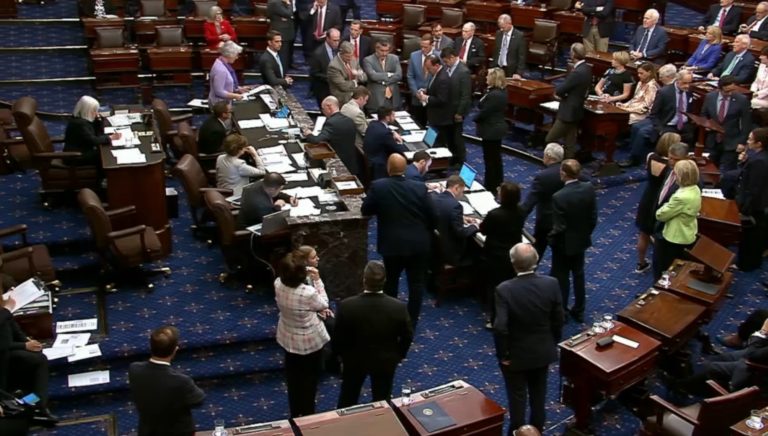The U.S. Senate passed the debt limit bill in a 63-36 vote late Thursday night. It has already passed the House and will now be sent to the president’s desk for a signature.
Sen. Dan Sullivan voted against the bill on final passage, while Sen. Lisa Murkowski voted in favor of it.
In all, 17 of the 49 Senate Republicans voted in favor of passage, including Senators John Boozman, AR; Shelley Capito, WV; Susan Collins, ME; John Cornyn, TX; Kevin Cramer, ND; Joni Ernst, IA; Chuck Grassley, IA; John Hoeven, ND; Mitch McConnell, KY; Jery Moran, KS; Markwayne Mullin, OK; Lisa Murkowski, AK; Mitt Romney, UT; Mike Rounds, SD; John Thune, SD; Thim Tillis, NC; and Todd Young, IN.
Sullivan said the cuts to defense spending, which occur due to inflation, is happening a one of the most dangerous times for U.S. national security in decades.
“I applaud Speaker McCarthy for his hard work in getting President Biden to negotiate a debt ceiling agreement that averts a default, reduces wasteful spending, and authorizes critically-needed permitting reforms—all of which I support. However, I could not vote for an agreement that fails one of the most critical duties of the United States Senate: adequately funding our military service members to provide for the security and defense of our nation,” Sullivan said. “This agreement inflicts significant inflation-adjusted cuts to our military, shrinking the Army, Navy, and Marine Corps. This bill also will take the U.S. defense budget below three percent of GDP—a level we’ve seen just once in the past eighty years, during the peace dividend era of the late 1990s.
“We are not in a ‘peace dividend’ era today. Far from it. America’s military leaders all agree we are in the midst of one of the most dangerous periods for U.S. national security since World War II. This rushed budget simply does not meet the reality and the threats of this moment. I was disappointed that the vast majority of my Democratic colleagues voted against my amendment, which received bipartisan majority support and would have rectified some of these significant defense budget shortfalls,” he said.
During consideration of the Fiscal Responsibility Act this evening, Sen. Sullivan offered an amendment to rescind more than $70 billion in previous Internal Revenue Service (IRS) appropriations in order to fund the Department of Defense’s (DOD) Fiscal Year 2024 unfunded priorities and to fund a five percent increase to the FY 2025 budget beyond the new FY 2024 defense budget topline. All Republican senators voting supported the Sullivan amendment, but it failed to reach the 60-vote threshold for adoption.
Earlier this week, Rep. Mary Peltola of Alaska voted in favor of the bill when it was in front of the House.
The Fiscal Responsibility Act suspends the nation’s debt limit through Jan. 1, 2025, after the November, 2024 election, when all House members, the president, and 33 of the 100 members of the Senate are up for reelection.
An amendment to claw back unspent and unneeded Covid-19 funds failed, with Sen. Murkowski joining the Democrats to vote against it, while Sen. Sullivan voted in favor of it.

Sullivan offered an amendment to take money from the Internal Revenue Service, which was for more IRS agents, and put the money into the Department of Defense. That amendment failed, with all 49 Republicans voting in favor of it.
Sen. Lisa Murkowski offered a statement:
“I voted for the Fiscal Responsibility Act because it is the only way to avoid a default on the national debt just four days from now. While both the bill itself and the process that led to it were far from perfect, it will avert an economic disaster, protect the full faith and credit of the United States, and slightly improve our nation’s fiscal trajectory.
“While the Fiscal Responsibility Act fully funds veterans programs in Fiscal Year 2024, I do not believe it adequately supports the defense budget. After speaking with colleagues on both sides of the aisle, however, I believe there will be sufficient support to pass a supplemental later this year that better addresses our security needs, including continued support for Ukraine.
“I also see this measure as a series of first steps, not final agreements. It leaves us with more work to do to address our debt, reduce the spiraling costs associated with it, and begin to improve the federal permitting process. Beyond the incremental progress the Fiscal Responsibility Act makes, I hope it will build trust and create space for further bipartisan agreement in these critical areas.”
The bill is not an actual appropriations bill, but it raises the level the Department of Treasury can borrow to until after the next presidential election. It caps non-defense spending for a year, expands some work requirements for welfare, and has other provisions.







